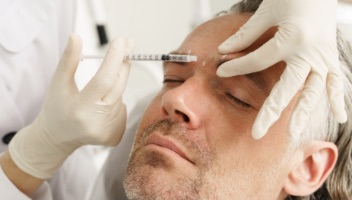Cysts
Understanding and Treating Cysts
What is a Cyst?
A cyst is a broad term for a fluid, semi-fluid filled, or keratin-containing sac that occurs within skin tissue and can appear anywhere on the body. Some cysts are tiny, while others, if left untreated, can become cosmetically or functionally significant. There are hundreds of types of cysts, many earning their name because of their location, including ovarian cysts, pancreatic cysts, and pericardial cysts.Diagnosis and Treatment
Most skin cysts are benign and respond favorably to dermatologic treatment. However, some lesions that appear cyst-like may be tumors and could be malignant. Accurate diagnosis is crucial to determine the appropriate treatment plan and ensure the best outcomes.
Expert Care at the Center for Surgical Dermatology & Dermatology Associates
Our skin experts at the Center for Surgical Dermatology & Dermatology Associates are highly skilled in diagnosing and treating various types of cysts. We use advanced techniques to assess your condition and develop a personalized treatment protocol tailored to your specific needs. Whether the cyst is small and benign or requires more significant intervention, our team is equipped to provide the best care possible.
Examples of Cysts






Symptoms of Cysts
- An abnormal lump on the surface or just below the skin.
- Slow-growing, painless and smooth to the touch when they are rolled under the skin.
- Cysts can appear anywhere, but generally appear on the face, neck, trunk and genital area.
What Causes Cysts?
- Cysts are caused blockage of ducts or glands in the body.
- Infection, leading to the formation of an abscess or cyst.
- Chronic inflammatory conditions.
- Genetic conditions that predispose individuals to cyst formation.
- Certain medications or drugs.
- Tumors or developmental abnormalities.
Cyst Prevention
- Practice good skin hygiene: reduces the risk of infections that may lead to cysts.
- Avoid skin trauma and injuries: minimizes the chances of cyst formation.
- Refrain from picking or squeezing the skin: prevents irritation and potential cyst development.
FAQS for Cysts
Some cysts may resolve on their own without intervention, especially if they are small and not causing symptoms. However, many cysts persist and may require medical attention. If a cyst is bothersome, inflamed, or growing, it's recommended to consult with a dermatologist for an evaluation and appropriate management.
Not all cysts require removal, particularly if they are small, asymptomatic, and not causing cosmetic concerns. However, removal may be recommended if a cyst becomes infected, inflamed, or if there are cosmetic reasons for removal. Additionally, some cysts may be removed for diagnostic purposes or if there is concern about the possibility of malignancy.
Cyst removal is typically a minor surgical procedure performed by a dermatologist. The procedure may involve:
- Local anesthesia to numb the area.
- Incision and drainage for fluid-filled cysts.
- Excision, which involves removing the entire cyst, including the cyst wall.
In some cases, the removed cyst may be sent for laboratory analysis to confirm the diagnosis. Proper postoperative care is essential to minimize the risk of infection and promote optimal healing.
Most cysts are non-cancerous (benign). However, the presence of a cyst does not rule out the possibility of other skin conditions or tumors. A healthcare professional, typically a dermatologist, can evaluate the cyst and recommend further testing or removal if necessary.
In many cases, cysts are not painful. However, they can become tender or sore if they become infected or inflamed. If a cyst is causing discomfort or becomes painful, it's advisable to seek medical attention.
How to Treat Cysts
- Practice good skin hygiene to reduce the risk of infections that may lead to cysts.
- Avoid skin trauma and injuries to minimize the chances of cyst formation.
- Refrain from picking or squeezing the skin to prevent irritation and potential cyst development.
Related Blog Posts

- Botox
- Injectables or Fillers
- Cosmetic Treatments
We get plenty of questions every day about the differences between BOTOX® and Dysport®, so we wanted to educate you – and set the record straight!
Read More
- Skin Cancer
- General Dermatology
- Chronic Skin Conditions
Learn more about the most common types of skin lesions we see and how our dermatologists remove them.
Read More
- Skin Care
- Cosmetic Treatments
Unlock the secrets to achieving radiant, glowing skin. Explore expert tips and skincare routines tailored to nourish and revitalize your complexion, empowering you to embrace a luminous and youthful appearance.
Read MoreFeatured Products

SkinCeuticals Daily Moisture
Daily Moisture is a lightweight face moisturizer for normal to oily skin that hydrates, nourishes, and helps reduce the appearance of pore size. Formulated with an exclusive combination of vitamin E and three nutrient-rich algae extracts. 2 fl oz / 60 mL

SkinCeuticals Phloretin CF Gel
Phloretin CF Gel is a revolutionary antioxidant technology combining 2% phloretin, 10% pure vitamin C (L-ascorbic acid), and 0.5% ferulic acid for enhanced protection against atmospheric aging – environmental damage and premature signs of aging caused by free radicals from UVA/UVB radiation. This daily topical vitamin C antioxidant also helps diminish the appearance of discoloration, refine skin texture, and improve skin tone. 1 fl oz / 30 mL
